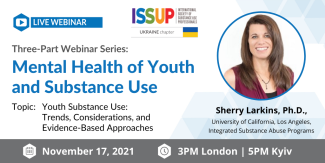Mental Health in Substance Use and Youth: Youth Substance Use - Trends, Considerations, and Evidence-Based Approaches

ISSUP Ukraine is pleased to invite you to attend the Final Webinar in their Three-Part Series on 'Mental Health of Youth and Substance'. This Webinar will focus on Youth Substance Use: Trends, Considerations, and Evidence-Based Approaches.
Time: 3PM UK Time / 5PM Ukraine Time
Register for the Webinar
The focus of this Series is to raise issues around youth mental health and to bring acknowledgment that is connected with substance use. Three world-known speakers will discuss depression, self-harm, suicide behavior and comorbidity of mental health and substance use disorders in youth.
Substance-abusing youth are at higher risk of incurring mental health problems, including depression, personality disorders, suicidal behaviours compared to non-users. Substance abuse may increase symptoms of mental illness or trigger the new one. Similarly, young with depression are at higher risk of using substances. As many young people with mild depression go undiagnosed, the condition can appear to be the result of addiction. Substance use disorders among depressed youths are a risk factor for suicidal behaviors.
Presenter:
Sherry Larkins, Ph.D.,
University of California, Los Angeles, Integrated Substance Abuse Programs
Dr. Larkins has worked for the University of California, Los Angeles – Integrated Substance Abuse Programs since 1998. She has lead various international and domestic evaluation, training and capacity-building projects over the last two decades. Prior to these activities, she oversaw epidemiological and clinical research studies investigating the spread of HIV and other sexually transmitted infections among substance users, with a focus on treatment interventions for high risk populations. She has been involved in substance abuse research for over 20 years and completed her doctorate in medical sociology at Rutgers University in 1999. Her research interests include stimulant abuse, adolescent substance use, treatment for marginalized populations, sexual risk behaviors associated with substance use, and qualitative methodologies.
